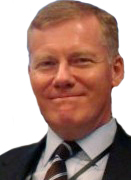 “Rules that govern mineral resource related activities in the international seabed area should be basically the same, or of an equivalent standard, as those now being developed inside the national jurisdictions of Pacific Island countries,” said Michael Lodge, Legal Counsel for the International Seabed Authority (ISA).
“Rules that govern mineral resource related activities in the international seabed area should be basically the same, or of an equivalent standard, as those now being developed inside the national jurisdictions of Pacific Island countries,” said Michael Lodge, Legal Counsel for the International Seabed Authority (ISA).
Mr. Lodge was invited to contribute to a three-day High Level Meeting recently held in Fiji that launched the Deep Sea Minerals Project organized by SPC/SOPAC Division and funded by the EU.
The High Level Meeting addressed legislative, regulatory, capacity requirements and environmental issues pertaining to deep-sea mineral mining for countries in the Pacific region.
The ISA has been mandated with signatories of 162 countries to manage the mineral resources of the international seabed beyond national jurisdiction.
Mr. Lodge emphasised the importance of setting the rules in seabed mining, especially for the private investor.
“You want private money to invest in a seabed mine, because it’s only going to happen with private money because of the expense. The problem is that you cannot get that entrepreneur to invest unless he knows what the rules are.”
He said that it was a part of the role of governments to support the research required to verify resources, with the help of companies like Nautilus Minerals, to take the challenge and invest the “serious money.”
The Pacific’s first commercial mining lease has been granted in Papua New Guinea territorial waters to mine ‘high grade’ Seafloor Massive Sulphide (SMS) deposits, with startup scheduled for latter part of 2013.
Mr Lodge said that the rules set by the island countries on seabed mining should be just as effective as those set by ISA.
“The rules that are set for inside national jurisdiction should be no less effective than those set for outside national jurisdiction, and vice versa.
“So definitely, we have international rules, that we’ve developed by consensus, so that really forms a baseline for island countries to set up their own national laws and policies. Of course, they can be more stringent if they want to, and in some areas, maybe they should be, but they’ve definitely have to be no less effective,” said Mr Lodge.
He pointed out that ISA has spent the last ten years developing the environmental rules and guidelines for the international seabed area, but added that Papua New Guinea was far ahead of the world in developing environmental standards for seabed mining .
“Environmental standards like those Papua New Guinea has applied to Nautilus, and that Nautilus has developed as an environmental plan, that’s a model that we can take and use in international waters,” Mr. Lodge said.
He reiterated that there should be no difference between the standards set by island countries and those set by ISA.
“The standards have to be the same. And the one thing that the countries have to be aware of is that if we get into exploitation, then it could become a matter of competition.
“Where are you going to go? Are you going to go by the rules of national jurisdiction, or are you going to go by those set for the high seas? Are you going to go where the rules are softer? Or it where will cost you less? So it is very undesirable to get a situation where the standard in another island country is less than that in Papua New Guinea, for example.
Mr Lodge cited the environment as an area that could be exploited but, he added, with the same rules governing both island countries and the International Seabed Authority, among other facets of seabed mining, commercial companies will understand their limitations.
“But,” he added, “presently there are no regulations addressing waste removal in seabed mining because nobody has done it yet, so it is very hard to regulate until we know exactly what technology is going to be used. Nautilus, so far, is the only one who has started to think about technology towards this end. They will have to test it and evaluate the results of the test, and then we can continue to modify the rules as they go along.”
Mr. Lodge said that much like SOPAC, ISA is collecting data all the time.
“In fact, we work very closely with SOPAC. I don’t think the Pacific countries realise that they are shareholders in the ISA; they are all members.”
Although the ISA is based in Kingston, Jamaica, in the Caribbean, Mr. Lodge was asked if the Authority had plans to open a regional office in the Pacific.
“There is merit in this,” he said. “A major part of the world’s seabed exploration is now taking place in this part of the world. We should certainly take a close look at the possibility.”





